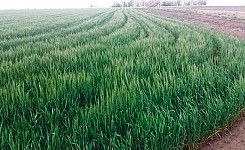Compost Carbon Fertilisers naturally composted fertilisers
Natural soil processes involve a symbiotic relationship with soil microbes to convert minerals into plant-available nutrients, and to transport these nutrients to the plant.
CCF uses microbes naturally found in soil to manufacture a range of fertilisers using a proprietary system that reproduces the natural microbial composting and fermentation processes.
Combining SCF's microbial fertiliser technology with access to organic wastes has resulted in the production of a range dry fertilisers that:
- Enhance sustainability by recycling organic nutrient source
- Deliver a more comprehensive nutrient package
- Mitigate against nutrient leaching
- Enhance soil structure
- Replenish soil organic carbon
Soil Carbon Fertilisers range benefits the crop
- Maintain optimum nutrient levels for longer
- Stimulate greater root development due to the natural release of beneficial exudates including vitamins, enzymes and plant hormones
- Increase mycorrhizal fungi populations leading to better nutrient access
- Improve rhizosphere mechanisms with a unique combination of Fulvic and Amino Acids.
Soil Carbon Fertilisers range benefits the soil
- Minimise nutrient losses due to leaching
- Reduce the adverse effects of salinity and acidity that can result from the application of conventional chemical fertilisers
- Stimulate beneficial soil microbes naturally present in the soil to correct any imbalance with pathogenic microbes
- Improve soil structure by the addition of minerals and humates that help with water and nutrient retention
- Add carbon to improve soil structure and boost microbial populations
- Low heavy metal levels (cadmium and lead).
Organic Matter Content
How much organic matter is present in the soil can only be determined by baking the soil sample at a particular degree which burns all the combustible components from the soil leaving out only the organic matter. The compost is also tested in a similar way but the rate at which the soil sample is baked is a bit higher, according to soil testing Melbourne Organizations.
Nutrient Analysis
In the nutrient analysis, all of the minerals and nutrients such as phosphorus, potassium, calcium, magnesium, sulfur, micronutrients, aluminum and lead are tested and removed from the soil sample to get the maximum idea of how probable the soil is for the particular task it needs to serve for. Since there is a lot of nitrogen already present in the air, it is not tested through the normal soil sample but is rather estimated through the field history and is determined by the soil samples of the adjacent and nearby buildings' foundation.





